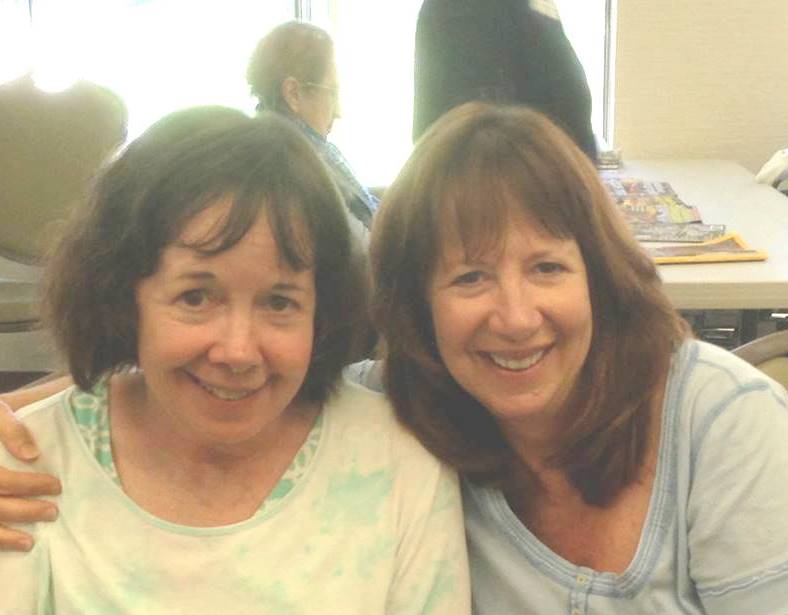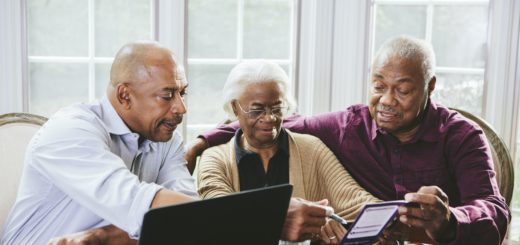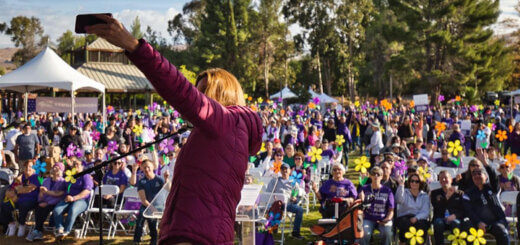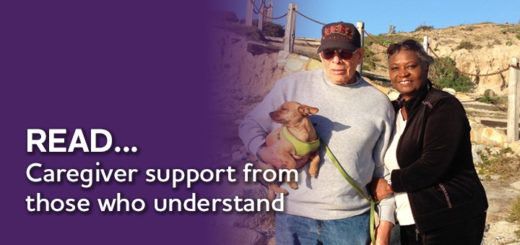Support for families facing Alzheimer’s and Down syndrome
Marianne Iversen is a social worker with a passion for people with intellectual disabilities. In the past few years, she has worked with more families whose loved ones with Down syndrome are now facing Alzheimer’s. Marianne co-facilitates an Alzheimer’s Association telephone support group for caregivers of those living with Down syndrome and Alzheimer’s.
Living longer
In 1983, the average life expectancy of someone living with Down syndrome (DS) was 25 years. Now it is approximately 60 years. As adults with DS live longer, more are developing Alzheimer’s disease.
According to the National Down Syndrome Society, about 30 percent of people with DS who are in their 50s have Alzheimer’s dementia. About 50 percent of people with DS in their 60s have Alzheimer’s.
Marianne Iversen is a social worker with a passion for people with special needs. She has been working for Down Syndrome Connection of the Bay Area (DSCBA) for over 10 years. She currently serves as Director of Programs and Adult Services.
“Most of the Down syndrome associations across the country focus primarily on younger families,” said Marianne, “where the need is so strong.” It has been challenging to help families realize that her organization is there to support individuals throughout their lives, including during the aging process.
Alzheimer’s and Down syndrome
Marianne first learned about the increased risk of Alzheimer’s among people living with DS about seven years ago. A couple of years later, she started to see an influx of families seeking Alzheimer’s resources. Many families were unaware of the increased risk of Alzheimer’s disease until they experienced it personally.

Marianne also has a personal connection to Alzheimer’s. Almost 10 years ago, her sister, Sharon (who does not have DS) was diagnosed with younger-onset Alzheimer’s in her mid-50s. “With my sister’s diagnosis and my work with DSCBA,” Marianne shares, “Alzheimer’s connects me to both worlds.”
Challenges in getting a diagnosis
Autopsy studies show that by age 40, the brains of almost all individuals with DS have significant levels of beta-amyloid plaques and tau tangles, abnormal protein deposits considered Alzheimer’s hallmarks. But not all go on to develop Alzheimer’s.
As people with DS started living longer, some doctors were not aware of the connection between Down syndrome and Alzheimer’s disease (DS&AD). Families found that doctors falsely attributed the Alzheimer’s symptoms to DS.
As doctors have learned more about the connection, Marianne finds that some are now more likely to make an Alzheimer’s diagnosis quickly. They may not complete tests to rule out other health issues that may cause similar symptoms.
Document their abilities early
Many adults with DS are living in supportive environments or group homes. Often there are frequent staff changes and new staff don’t know what abilities a person had. This can make it difficult to recognize changes that are symptoms of Alzheimer’s.
Even when the person is living with a family member, changes can be subtle. If they are living with a parent or older sibling, that person may be having their own cognitive challenges.
Experts suggest that families document baseline adult function by age 35. Ongoing evaluation of intellectual, behavioral and social function is important for everyone with DS. By age 35, each individual’s medical record should include detailed information on their adult abilities. The person with DS, family members and other reliable individuals are helpful sources for this information.
Individuals living with DS are not likely to self-report memory decline or other symptoms of Alzheimer’s. Having documentation of the person’s abilities can help when there is a change in doctor or caregiver. If they know what the person is capable of doing, they will better be able to identify potential symptoms of Alzheimer’s, instead of assuming that the person has never done the task.
Difficulties finding residential care
Like many caregivers of a loved one with Alzheimer’s, Marianne says that the biggest challenge often comes when the parent or sibling can no longer care for the person safely at home. Many residential care facility or in-home care staff don’t have experience caring for people living with both DS&AD.
People living with DS&AD are also often younger than most residential care facility residents. This can make it difficult for families to find appropriate care.
“I think it’s fear and a lack of understanding from the agency staff,” Marianne shared. “In my experience, in the later stage, there isn’t that big of a difference between someone who just has Alzheimer’s or someone who has DS&AD. The behaviors are the same.” With a bit of training, care staff can be successful.
More parental and sibling caregivers
While many people living with Alzheimer’s are cared for by a spouse or child, Marianne often speaks with parents or siblings who are caring for their loved one living with DS&AD. They face different issues.
It is common for an aging parent and adult child with DS to be living together. As the parent ages, their own health issues can impact the level of support they can provide for their child. This can lead to changes in the adult with DS. Siblings may not be aware of the issues until there is a crisis.
One woman who reached out to Marianne is caring for her brother, who has DS and symptoms of Alzheimer’s. He lives with their mother, who is almost 90 years old and is on dialysis. This sibling is caring for both her parent and her brother. She had not heard of the connection between DS&AD until Marianne mentioned it to her.
Help for families
Several years ago, Marianne had three families reach out whose loved ones had been diagnosed with Alzheimer’s. It was difficult for them to find resources on Alzheimer’s disease among those living with DS.
Marianne reached out to the Alzheimer’s Association office in Lafayette to find out what support existed for these families. She connected with Heather Gray, Family Program Manager, and learned more about Alzheimer’s Association support and education programs.
Launching a support group
Initially, Heather and Marianne tried to offer an in-person support group for caregivers of people living with DS&AD. But it was difficult for caregivers to meet in person. After those families lost their loved ones, the group stopped meeting.
About four years ago the ARC San Francisco received a grant to support those impacted by DS&AD in San Francisco. Marianne shared her past experience with them and suggested that they try a telephone group. They connected with Alzheimer’s Association staff and started co-facilitating a telephone support group.
After the grant ended, Marianne and Heather worked together to keep the group going and open it up to the entire chapter. Marianne has taken over facilitation of the support group, along with Paula Gann, whose daughter, Kyle, has DS&AD. The Alzheimer’s Association continues to provide support.
“The need for a support group for these families to get together is so strong,” Marianne said. “It provides a connection with others who understand what they are going through.”
You’re not alone
It can be a challenge for families to find services that are specific to their situation. Sometimes caregivers don’t feel that they fully fit in with the Down syndrome community or the Alzheimer’s community, since their loved ones are experiencing both conditions.
Marianne shared how helpful it is for caregivers to know that support is available. “It’s important to know that they aren’t alone, that connection with others is super important,” she shared. “Sometimes they get wrapped up in constant care and forget to care for themselves.”
Caregivers can get often get depressed. For this generation of people living with DS&AD, “their parents were the pioneers who started so many of the programs for inclusivity that exist today,” notes Marianne. “They were the fighters who were changing laws. They have been advocating for their children their entire lives and to get to the point where their children are developing Alzheimer’s can be a stab in the gut.”
More families reaching out
Marianne has seen changes over time in caregivers seeking services. As adults with DS age, their families are starting to reach out to agencies for support with new issues that they face, including a diagnosis of Alzheimer’s disease.
At a recent support group, one attendee who is caring for her brother was struggling with how to handle her brother’s behaviors. As she talked with others in the group, “she showed a better understanding that these were symptoms that were beyond her control,” Marianne noticed. “She just needed confirmation that this was something she wasn’t going to be able to change.”
Understanding that it’s the disease that is causing the behaviors has helped the caregiver be more patient and become less frustrated. This improves things for her and her brother.
Marianne appreciates the value of allowing caregivers to talk about their challenges and process out loud with others who understand their situation. She noted that “most caregivers don’t have that opportunity.”
The caregiver support group for caregivers of those living with Down syndrome and Alzheimer’s meets the 3rd Thursday of the month from 6-7 p.m. For more information and to register for the meeting, call Marianne Iversen, 925.362.8660 ext. 103 or email marianne@dscba.org.
Learn more about other caregiver support groups offered by the Alzheimer’s Association, call 800.272.3900 24/7 for information and support.
Learn more:
- Down syndrome and Alzheimer’s
- Alzheimer’s Association 24/7 Helpline
- Alzheimers’ caregiver support groups, including group for caregivers of loved ones with DS&AD
- Down Syndrome Connection of the Bay Area
- National Institute on Aging: Alzheimer’s Disease in People with Down Syndrome
- National Task Group on Intellectual Disabilities and Dementia Practices: Early Detection Screen for Dementia
- Jenny’s Diary: A resource to support conversations about dementia with people who have an intellectual disability
UCTV: Down syndrome and Alzheimer’s

















